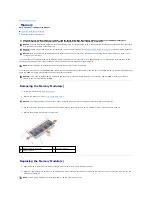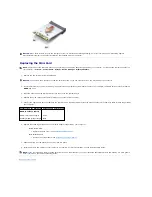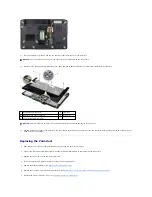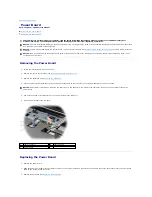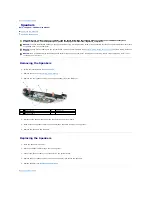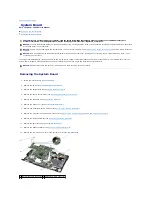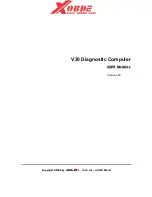
13.
Disconnect the thermal fan cable, speaker cable, and USB board cable from the respective system board connectors.
14.
Lift the system board at an angle toward the side of the computer and out of the computer base.
15.
If required, remove any installed Mini-Card (see
Removing the Mini-Card
).
Replacing the System Board
1.
If required, replace Mini-Card, (see
Replacing the Mini-Card
).
2.
Replace the system board in the computer base.
3.
Connect the thermal fan cable, speaker cable, and USB board cable to the respective system board connectors.
4.
Replace the four screws that secure the system board to the computer base.
5.
Replace the daughter board (see
Replacing the Daughter Board
).
6.
Replace the palm rest (see
Replacing the Palm Rest
).
7.
Replace the display assembly (see
Replacing the Display Assembly
).
8.
Replace the processor heat sink and the processor (see
Replacing the Processor Heat Sink
and
Installing the Processor
).
9.
Replace any installed memory modules (see
Replacing the Memory Module(s)
).
10.
Replace the base cover (see
Replacing the Base Cover
).
11.
Replace the keyboard (see
Replacing the Keyboard
).
12.
Replace the center control cover (see
Replacing the Center Control Cover
).
13.
Replace the optical drive (see
Replacing the Optical Drive
).
14.
Replace the hard drive (see
Replacing the Hard Drive
).
15.
Reinstall the ExpressCards in the ExpressCard slot, if any.
16.
Slide the battery into the battery bay until it clicks into place.
17.
Turn on the computer.
18.
Insert the BIOS upgrade CD that accompanied the replacement system board into the appropriate drive. Follow the instructions that appear on the
screen.
Back to Contents Page
3 speaker cable connector
4 system board
5 screws (4)
NOTICE:
Before turning on the computer, replace all screws and ensure that no stray screws remain inside the computer. Failure to do so may result in
damage to the computer.
NOTE:
After you have replaced the system board, enter the computer Service Tag into the BIOS of the replacement system board.



